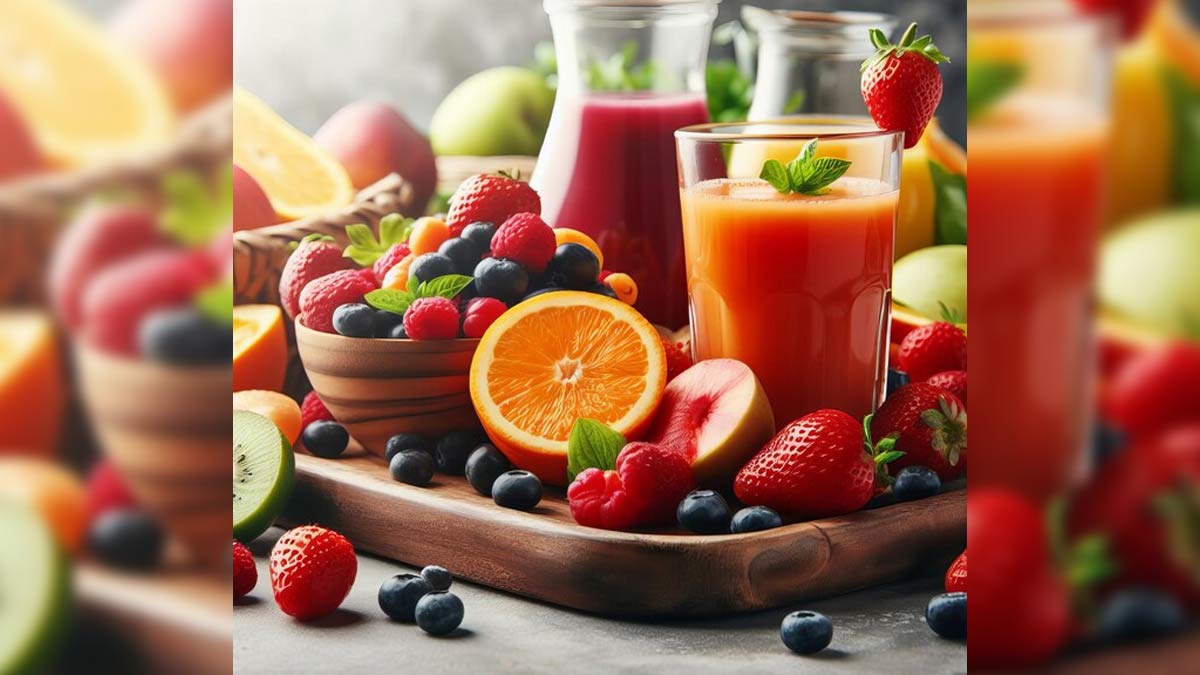
Fruit juices are often hailed as a healthy breakfast option, but recent studies suggest that consuming them first thing in the morning might not be as beneficial as it seems. While fruit juices are rich in vitamins, they also come with drawbacks that can affect your health in the long run. Understanding the risks associated with having fruit juices for breakfast can help you make better dietary choices.
Table of Content:-
1. High Sugar Content
One of the primary reasons to avoid fruit juices during breakfast is their high sugar content. Even though the sugar in fruit juices comes from natural sources, it can still spike your blood sugar levels. For instance, orange juice contains around 21 grams of sugar per 240 ml serving, similar to what you might find in soft drinks.
A study published in the journal Diabetes Care highlighted that consuming sugar-laden beverages, including fruit juices, can lead to an increased risk of developing type 2 diabetes. The rapid rise in blood sugar levels caused by fruit juice, especially on an empty stomach, forces your body to produce a large amount of insulin, which may eventually lead to insulin resistance—a precursor to diabetes.

2. Lack of Fibre
One of the major differences between whole fruits and fruit juices is the lack of fiber. Fiber is essential for maintaining digestive health, and it also helps regulate blood sugar levels by slowing down the absorption of sugar into the bloodstream.
According to a 2013 study in The British Medical Journal, people who consumed whole fruits, particularly blueberries, grapes, and apples, had a lower risk of developing type 2 diabetes compared to those who consumed fruit juices. This is because whole fruits retain their fiber content, while juices strip most of it away. Without fiber, you're left with a concentrated source of sugar that enters your bloodstream rapidly, contributing to sugar spikes and energy crashes.
Also read: Fruit Juice Vs Whole Fruit: Which Is Best For Weight Loss
3. Empty Calories
Many people believe that fruit juices are filling and nutritious, but they are actually packed with empty calories. Because they lack fiber, they don't provide the same satiety that whole fruits or balanced meals do. Drinking a glass of juice might give you a burst of energy, but it can leave you feeling hungry shortly afterward.
A 2015 study published in The American Journal of Clinical Nutrition found that beverages, including fruit juices, tend to have a weaker impact on satiety than solid foods. As a result, you may end up eating more calories later in the day to compensate, leading to weight gain over time.

4. Impact on Dental Health
Fruit juices are highly acidic, which can have a negative impact on your dental health. The combination of sugar and acidity can erode tooth enamel, leading to cavities and other dental issues. Even juices that are marketed as healthy, such as orange juice, can be particularly harmful when consumed frequently.
A study published in The Journal of Dentistry found that fruit juices are a leading cause of enamel erosion in both adults and children. Drinking juice during breakfast, especially without brushing your teeth immediately afterward, can contribute to long-term dental problems.
Also read: Fruit Juice VS Whole Fruits, Which Is The Healthier Option? Expert Answers
Better Alternatives to Fruit Juices
Instead of reaching for fruit juice in the morning, there are healthier alternatives that provide balanced nutrition. Here are a few options:
Whole Fruits: Eating whole fruits provides fiber, which helps slow the absorption of sugar and keeps you feeling full longer.
Smoothies: If you enjoy fruit-based drinks, try making a smoothie with whole fruits, yogurt, and seeds like chia or flax. This will retain the fiber and offer additional nutrients.
Water or Herbal Tea: Staying hydrated is essential, and water or unsweetened herbal teas are much better options to accompany your breakfast.
Protein-Rich Breakfast: Opt for eggs, oats, or yogurt with nuts and seeds to keep your blood sugar stable and provide sustained energy throughout the day.
Conclusion
While fruit juices may seem like a quick and healthy breakfast option, they come with several risks, including high sugar content, lack of fiber, and negative effects on both your blood sugar and dental health. Instead, opt for whole fruits, smoothies, or protein-rich meals to start your day on a healthier note. Making small changes in your breakfast routine can have a significant impact on your long-term health, helping to regulate blood sugar, maintain a healthy weight, and protect your teeth.
Also watch this video
How we keep this article up to date:
We work with experts and keep a close eye on the latest in health and wellness. Whenever there is a new research or helpful information, we update our articles with accurate and useful advice.
Current Version